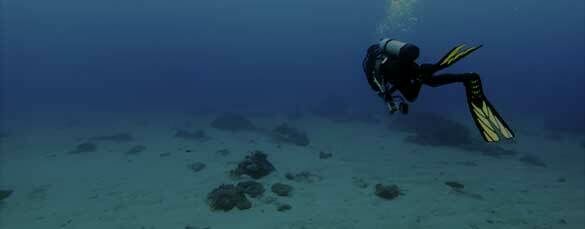Dysbaric illness
Individuals who have had pulmonary barotrauma or neurological decompression illness are thought to be generally more susceptible to subsequent episodes as a result of pre-existing abnormal pathology, including lung disease and intracardiac right-to-left shunts (1-7). In addition, subsequent neurological insults in these individuals are thought to be more difficult to treat and are believed to leave greater residual disability (5).
Therefore, any person who has suffered from pulmonary barotrauma or neurological decompression illness, should be carefully assessed to determine whether they should resume sport diving. The assessment will involve enquiry into the circumstances of the incident (including a precise dive history). Particularly when the episode of dysbaric illness occurred within the tables, assessment will often require tests to exclude the presence of an intracardiac shunt and lung disease likely to predispose to pulmonary barotrauma. The tests which may be performed include contrast echocardiography and sophisticated tests of lung function. The case should be examined by a Medical Referee who has obtained information from the treating physician. If the individual is permitted to resume diving, restrictions on depths, times and repeat dives may be imposed.
Further enquiries about testing for physical predisposition to decompression illness can be made to:
Dr Peter Wilmshurst, Consultant Cardiologist, Royal Shrewsbury Hospital, Mytton Oak Road, Shrewsbury, SY3 8XQ. Tel: 01743 261000
References:
1. McIver NKI. Assessment of divers with pulmonary barotrauma. Wilmshurst P, ed. Nottingham Medical Conference Proceedings. British Sub-Aqua Club 1987; 64-9.
2. Leitch DR, Green RD. Recurrent pulmonary barotrauma. Aviation, Space and Environmental Medicine 1986; 1039-43
3. Moon RE, Camporesi EM, Kisslo JA. Patent foramen ovale and decompression sickness in divers. Lancet 1989; I: 513-4.
4. Wilmshurst PT, Byrne JC, Webb-Peploe MM. Relation between interatrial shunts and decompression sickness in divers. Lancet. 1989 Dec 2;2(8675):1302-6. doi: 10.1016/s0140-6736(89)91911-9. PMID: 2574256.
5. Wilmshurst PT. Paradoxical gas embolism in a scuba diver with an atrial septal defect. British Medical Journal 1987; 294:121
6. Wilmshurst PT, Davidson C, O’Connell G, Byme C. Role of cardiorespiratory abnormalities, smoking and dive characteristics in the manifestations of neurological decompression illness. Clinical Science 1994; 86: 297-303.
7. Wilmshurst P, Bryson P. Role of cardiorespiratory abnormalities in the manifestations of neurological decompression illness. Clinical Science 1995; 88: 595. November 1996



